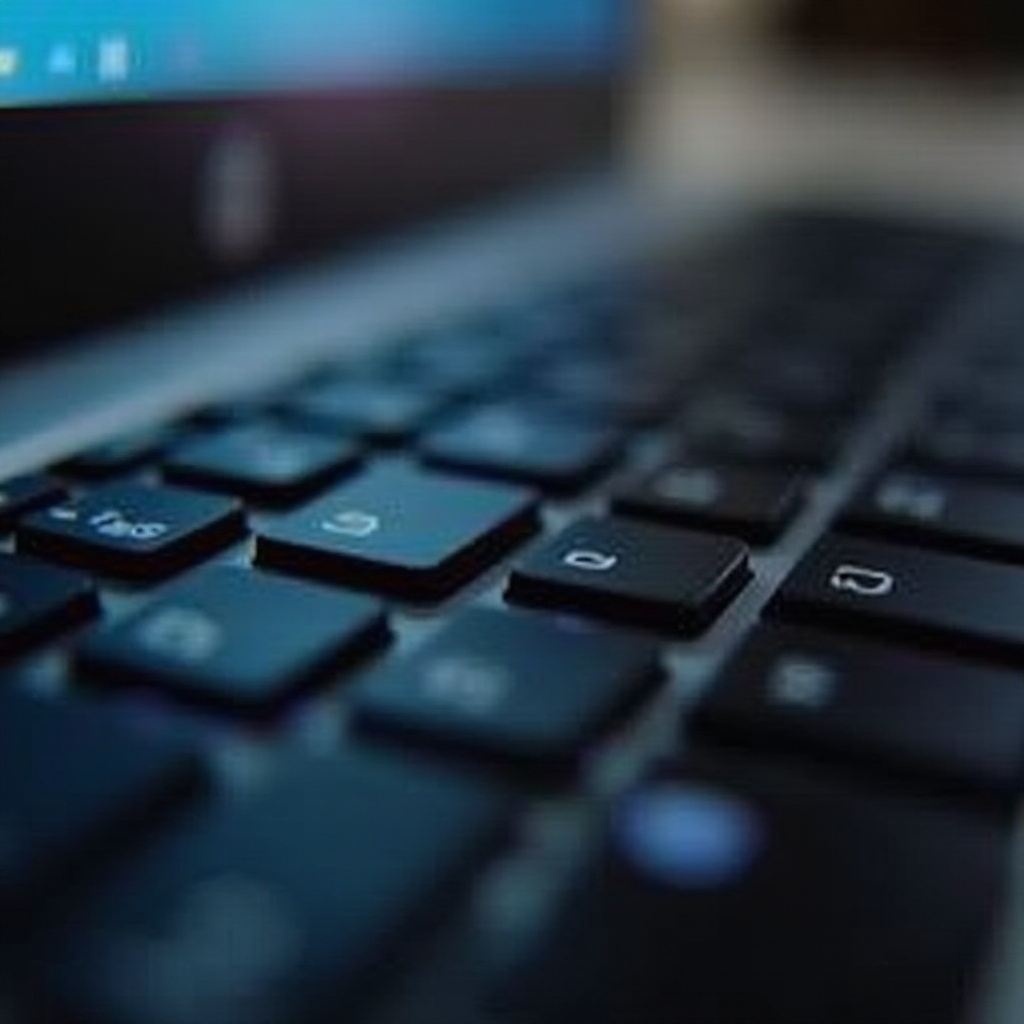Introduction
Experiencing a malfunctioning keyboard on your HP laptop can be incredibly frustrating. Whether you’re trying to write an important email, complete a project, or simply surf the web, a non-functional keyboard stops you in your tracks. Fortunately, many common keyboard issues are easy to diagnose and fix.

Common Reasons for Keyboard Malfunction
Understanding the root cause of why your HP laptop keyboard isn't working is the first step toward finding a solution. There are several reasons why your keyboard might be malfunctioning:
Hardware Issues
Physical damage or internal hardware faults can cause keyboard problems. Accidental drops or spills can also result in certain keys or the entire keyboard not working properly.
Software Glitches
Software errors or conflicts can also lead to keyboard malfunctions. These issues might arise from outdated drivers or conflicts with other software installed on your laptop.
Dirt and Debris
Accumulated dirt, dust, or crumbs can interfere with the keys' proper functioning. Regular cleaning can help prevent these issues.
Transition: With an understanding of the potential causes, the next step is to perform some initial checks to identify and possibly solve the problem.
Initial Checks to Perform
Before diving into more detailed troubleshooting steps, performing these initial checks can often resolve the issue quickly:
Check Keyboard Connection
Ensure the keyboard is properly connected. If you're using an external keyboard, check the USB or Bluetooth connection. For built-in keyboards, ensure there are no loose connections.
Restart the Laptop
Sometimes, a simple restart can resolve software glitches causing the keyboard issue. Save your work, restart your laptop, and check if the keyboard starts working.
Ensure Drivers Are Up to Date
Outdated drivers can lead to malfunctioning hardware. Check for driver updates through the Device Manager:1. Open Device Manager by right-clicking the Start button and selecting it.2. Expand the Keyboards section.3. Right-click your keyboard device and select 'Update driver.
Transition: If the initial checks don't solve the problem, you may need to delve into software troubleshooting steps.
Software Troubleshooting Steps
Software issues can often cause keyboard malfunctions. Follow these steps to troubleshoot and resolve software-related problems:
Reinstall the Keyboard Driver
Reinstalling the keyboard driver can resolve many software-related issues:1. Open Device Manager.2. Expand the Keyboards section.3. Right-click your keyboard device and select 'Uninstall device.4. Restart your laptop to automatically reinstall the driver.
Check for Windows Updates
Windows updates can include fixes for known issues with hardware:1. Open Settings by pressing Windows + I.2. Go to Update & Security.3. Click 'Check for updates' and install any available updates.
Use Windows Troubleshooter
The Windows Troubleshooter can help identify and fix keyboard issues:1. Open Settings.2. Go to Update & Security > Troubleshoot.3. Select Keyboard and run the troubleshooter.
Perform a System Restore
If your keyboard issue started recently, a system restore might help:1. Open Control Panel.2. Go to System and Security > System > System Protection.3. Click 'System Restore' and follow the prompts.
Transition: If software troubleshooting hasn’t resolved the issue, it might be time to consider hardware-based solutions.
Hardware Troubleshooting Steps
Investigating hardware-related issues might resolve your keyboard problem. Here are steps to diagnose and fix hardware issues:
Clean the Keyboard
Cleaning your keyboard can remove dirt and debris causing key malfunctions:1. Turn off your laptop.2. Use a can of compressed air to blow out dust and debris.3. For sticky keys, use a lightly damp cloth to gently clean the keys.
Inspect for Physical Damage
Check for any visible signs of damage:1. Turn off your laptop and remove the battery if possible.2. Inspect the keyboard for any physical damage, such as broken keys or loose connections.
Test with an External Keyboard
An external keyboard can help determine if the issue is with your built-in keyboard:1. Connect an external keyboard via USB or Bluetooth.2. If the external keyboard works, the built-in keyboard might need replacing.
Transition: For more persistent issues, advanced solutions may be required.

Advanced Solutions
For more stubborn problems, advanced troubleshooting may be necessary:
Check BIOS Settings
Incorrect BIOS settings can affect your keyboard:1. Restart your laptop and enter the BIOS setup (usually by pressing F10, F2, or DEL during startup).2. Check the keyboard settings and ensure the integrated peripherals option is enabled.
Perform a System Reset
A system reset can resolve persistent software issues:1. Open Settings.2. Go to Update & Security > Recovery.3. Click 'Get started' under Reset this PC and follow the prompts.
Seek Professional Repair
If all else fails, professional repair might be necessary:1. Contact HP support.2. Visit an authorized repair center for diagnostics and potential repair.
Transition: After fixing your keyboard issue, consider preventive measures to avoid future problems.

Preventive Measures
Preventive measures can help keep your keyboard in good working condition:
Regular Cleaning Routines
- Clean your keyboard regularly to prevent dirt and dust build-up.
- Use a can of compressed air to blow out debris.
- Wipe the keys with a damp cloth occasionally.
Using Keyboard Protectors
- Use a keyboard protector to avoid spills and debris.
- Ensure it fits your laptop model properly.
Avoiding Spills and Debris
- Keep food and drinks away from your laptop.
- If a spill occurs, turn off your laptop immediately and clean it.
Conclusion
While a malfunctioning keyboard can be a significant inconvenience, identifying the cause and following these comprehensive troubleshooting steps can help you get your HP laptop keyboard back in working order. Regular maintenance and preventive measures can also ensure your keyboard remains functional for longer.
Frequently Asked Questions
How can I update my HP laptop’s keyboard driver?
You can update your keyboard driver via the Device Manager. Expand the Keyboards section, right-click your keyboard device, and select 'Update driver.'
What should I do if cleaning the keyboard doesn’t fix the issue?
If cleaning doesn't resolve the issue, try the software troubleshooting steps, such as checking for driver updates, running the Windows Troubleshooter, and performing a system restore.
When should I consider professional repair?
Consider professional repair if all troubleshooting steps fail to resolve the keyboard issue or if you notice significant physical damage that cannot be fixed on your own.
